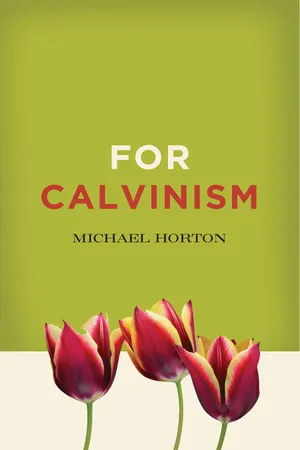![]()
NOTES
Introduction: Calvinism and Arminianism: Why Bother?
1. Clark Pinnock, “From Augustine to Arminius: A Pilgrimage in Theology,” in The Grace of God, The Will of Man: A Case for Arminianism, ed. Clark H. Pinnock (Grand Rapids: Zondervan, 1989), 23, 26, 27: “It is my strong impression that Augustinian thinking is losing its hold on present-day Christians. It is hard to find a Calvinist theologian willing to defend Reformed theology, including the views of Calvin and Luther, in all its rigorous particulars now that Gordon Clark is no longer with us and John Gerstner is retired.” Pinnock concedes that his changes are part of a growing accommodation to the secular mind: “We are finally making peace with the culture of modernity.”
2. John Calvin, Institutes 3.2.28. All references are from The Institutes of the Christian Religion (1559), Library of Christian Classics 20–21; ed. John T. McNiell; trans. Ford Lewis Battles (Philadelphia: Westminster, 1959).
3. Ibid., 3.2.29.
4. Charles Spurgeon, The Autobiography of Charles H. Spurgeon (Cincinnati: Curts & Jennings, 1898), 1:172.
Chapter One: The Essence of Calvinism
1. Kenneth J. Stewart, Ten Myths about Calvinism (Downers Grove, IL: InterVarsity Press, 2011), 75 — 96.
2. Calvin, Institutes, 3.2.1; 3.11.1; and “Sermon on Luke 1:5 — 10,” in Corpus Reformatorum (CR), ed. C. G. Bretschneider, H. E. Bindseil, et al. (New York: Johnson, repr. 1964), 46:23.
3. See, for instance, Heinrich Bullinger, De testamento seu foedere Dei unico et aeterno (1534); cf. Philip Melanchthon, Loci communes (1543), where the covenant concept repeatedly appears as a unifying factor.
4. B. B. Warfield, The Westminster Assembly and Its Work (New York: Oxford Univ. Press, 1931), 56.
5. John H. Leith, Creeds of the churches, 3rd ed. (Louisville: Westminster John Knox, 1983), 38 — 39.
6. Martin Luther, The Bondage of the Will (Grand Rapids: Revell, repr. 1990).
7. Despite his friendship with Calvin, Philip Melanchthon eventually came to question reprobation and taught a form of synergism (conditional election) that (in addition to his more Calvinist understanding of the Lord’s Supper) led to a strong reaction against him on the part of Luther’s orthodox followers. Their conclusions, summarized in the Formula of Concord, reject reprobation and affirm the resistibility of (and possibility of falling from) grace. At the same time, the Formula sharply rejects the synergism associated with Melanchthon’s view. See Charles Porterfield Krauth, The Conservative Reformation and Its Theology (Minneapolis: Augsburg, 1963), 322 — 24. Nevertheless, some Lutherans rejected this Confessional position in favor of Melanchthon’s view (conditional election, based on foreseen faith). See Heinrich Smid, Doctrinal Theology of the Evangelical Lutheran Church, trans. Charles A. Hay and Henry E. Jacobs (Minneapolis: Augsburg, 1889), 272–73.
8. Arminian (Remonstrant) theology, as it evolved into a system, rejected unconditional election and, consequently, its monoergistic emphases. The Counter-Reformation of the Roman Catholic Church offered yet another perspective on the divine decree. In between the classic Thomistic-Augustinian position defended by the Dominicans and the more Semi-Pelagian position adopted by the later Franciscans are the so-called “Molinists,” named after Molina who, with Suarez, defended a position identified as “middle knowledge” (scientia media). For a contemporary defense of this view see William Lane Craig, “The Middle Knowledge View,” in Divine Foreknowledge: Four Views (Downers Grove, IL: InterVarsity Press, 2001).
9. Roger Olson, Arminian Theology: Myths and Realities (Downers Grove, IL: InterVarsity Press, 2006), 53.
10. Richard Watson, Theological Institutes (New York: Phillips and Hunt, 1887), 2:392 — 449; Thomas N. Ralston, Elements of Divinity, ed. T. O. Summers (New York: Abingdon-Cokesbury, 1924), 278 — 327; William B. Pope, A Compendium of Christian Theology (New York: Phillips and Hunt, n.d.), 1:317–19; John Lawson, Introduction to Christian Doctrine (Grand Rapids: Zondervan, 1967, 1980), 206–35. See also Roger Olson, Arminian Theology, 18: “Contrary to confused critics, classical Arminianism is neither Pelagian nor semi-Pelagian! But it is synergistic”
11. Olson, Arminian Theology, 57.
12. Followers of this movement were radical Protestants who rejected all dogmas that they thought were inconsistent with reason and practical morality. Forerunners of modern Unitarians, Socinians denied the Trinity, the deity of Christ, and the substitutionary character of Christ’s atonement. They held that in order to affirm free will, God’s foreknowledge must include only necessary truths rather than the contingent decisions and acts of human beings. See the citations from the Racovian Catechism in William Cunningham, Historical Theology (Edinburgh: Banner of Truth, 1996), 2:173. Similar views at least on these points are advanced today in the movement known as “open theism,” particularly in the work of Clark Pinnock, John Sanders, and Gregory Boyd.
Chapter Two: Of Regents and Rebels: The Human Condition
1. Calvin, Institutes 1.1.1.
2. Catechism of the Catholic Church (New York: Doubleday, 1997), 405, 418.
3. Calvin, Institutes 2.2.10.
4. Ibid., 2.2.11.
5. Ibid., 2.1.9. See also 2.2.11 and 1.16.8.
6. John Calvin, Commentary on the First Book of Moses Called Genesis, trans. John King (Grand Rapids: Baker, repr. 1996),...
